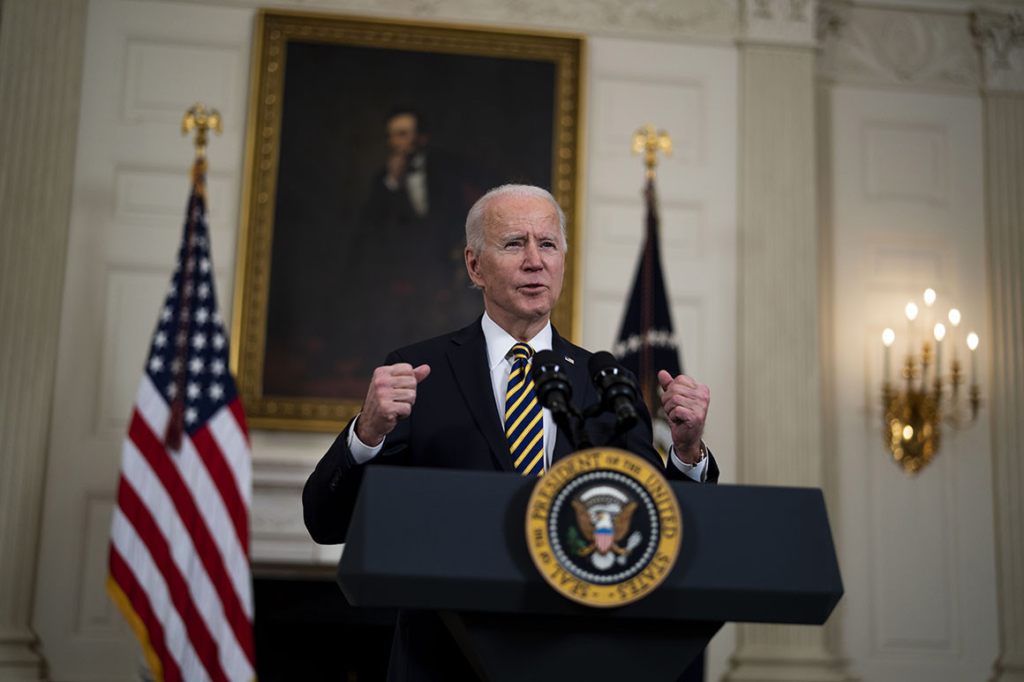Biden Approves Airstrike In Syria

Photo Courtesy of Politico
By Chris Carey
On Friday, February 26, President Joe Biden’s administration took definitive military action against an Iranian-backed base on the border between Syria and Iraq, calling in an airstrike and killing at least one member of an Iranian militia group while wounding others. This military action was taken without consulting all of Congress and was announced Monday, March 1 by a Pentagon spokesperson.
The attack was a response to a suspected Iranian attack on a U.S. coalition base in Iraq earlier this month. Spokesman for the Iranian Foreign Ministry Saeed Khatibzadeh said, “Iran considers Iraq’s stability and security as a key issue for the region … and rejects any action that disturbs the peace and order in that country.” During the earlier attack, one civilian was killed alongside U.S. and coalition troops who were wounded.
The guided bombs used in the U.S. retaliatory attack were delivered by two F-16 fighter jets. The target was a base of operations for Iranian-backed militia groups who operate in Syria and Iraq.
Internationally, this recent boost of aggression from Iran and the U.S. makes discussion of the U.S.-Iran Nuclear Deal more difficult. The deal, signed by President Obama in 2015, was reneged under the Trump Administration, but President Biden has since reaffirmed the United States’ interest in resuming talks on the matter.
The Sunday following the U.S. airstrike, Iran decided to refrain from further conversations about a deal until the United States agrees to lift some sanctions on the country. The deal itself would address lifting sanctions in exchange for Iran more strictly following regulations on its nuclear capacity and production of nuclear capable weapons.
At home, President Biden has received considerable pushback from Senate and House Democrats over his use of force and his action without full consultation.
Per The Hill, Senator Tim Kaine (D-VA), formerly Hillary Clinton’s Vice Presidential pick, stated, “I just strongly believe — and this goes back to the drafting of the Constitution and the earliest understandings of it — is that if a president is defending against an ongoing attack or imminent attack, the president does have some unilateral power and that’s good. But the idea of going on offense against groups, that’s traditionally where you ought to be coming to Congress.”
That same article outlines a new resolution that Senator Kaine intends to introduce which will limit the powers of the president in regards to military action without consulting Congress. Kaine went on to speak of how President Biden should understand that this was a breach, hearkening back to his days as the Chairman of the Foreign Affairs Committee, a committee that Kaine serves on now.
Connecticut’s Junior Senator, Chris Murphy (D), also weighed in, saying “Congress should hold this administration to the same standard it did prior administrations, and require clear legal justifications for military action, especially inside theaters like Syria, where Congress has not explicitly authorized any American military action.”
On the other side of the aisle, Senate Minority Leader Mitch McConnell (R-KY) stated, “I support President Biden’s decision to authorize strikes against facilities associated with Iranian-backed terrorist groups responsible for attacks against American interests in Iraq.”
This military action sets the tone early for a Biden Administration focused on brokering deals in the Middle East, and may be the beginning of some friction between President Biden and the Legislative Branch.
Editor’s Note: In a previous version of the article, it was stated that Congress was unaware of the strike. It has been revised to reflect that not all of Congress was consulted on the strike. 3/9/21







